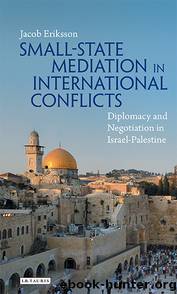Small-State Mediation in International Conflicts: Diplomacy and Negotiation in Israel-Palestine by Jacob Eriksson

Author:Jacob Eriksson [Eriksson, Jacob]
Language: eng
Format: epub
Tags: Political Science, International Relations, General
ISBN: 9780857725479
Google: YbeKDwAAQBAJ
Publisher: Bloomsbury Publishing
Published: 2015-08-19T01:48:41+00:00
IsraelâPalestine as a Social Democratic foreign policy priority
In line with their longstanding tradition and in contrast to the Conservatives, the Social Democratic government that returned to power in September 1994 made the Middle East a foreign policy priority.76 This intention was evident already during the aforementioned meeting between Beilin and Schori on 23 August 1994, when the former made the latter aware of af Ugglas' sponsorship of a secret channel. Beilin encouraged Schori and Sweden to generally increase their political involvement in the Middle East, suggesting additional roles as a channel of communication between Israel and Syria,77 and as leader of a potential working group for the co-ordination of international aid to the Palestinians (which already existed but was apparently not functioning smoothly). Schori asked him to seek contact with the Foreign Ministry after the election, regardless of who was in power, but assured him that should it be the Social Democrats, they would establish a working group to deal with these issues and co-ordinate future actions with Beilin. Schori ends his memo by saying that the Middle East is one area where Sweden âcould and should be more activeâ.78
The new government took a number of steps to make Schori's pledge a reality. In November, Foreign Minister Hjelm-Wallén and Schori himself, who had been appointed Minister of Development Cooperation, established a working group on the Middle East within the Foreign Ministry, led by Mikael Dahl. Discernable from the circulation of Schori's memo on his meeting with Beilin, Andersson remained very much in the loop in Social Democratic circles, and as noted previously, was on 1 December made an official government envoy on matters pertaining to the Middle East peace process. His relationship with Arafat specifically and the Swedish ties to the PLO generally made Sweden an interesting player, viewed as one of the few nations outside the Arab world that could have an effect on the Palestinian leader and act as a moderating influence. Any Israeli engagement in the wider Middle East would by default be viewed as a conspiracy by the Arab states to dominate the region culturally and economically. As a more objective, trustworthy observer, the Swedes could potentially calm this tendency and be of great use to Israel and the peace process.79
The cornerstone of their activities and Swedish Middle East policy as a whole, as outlined by Dahl,80 was to support the ongoing peace process â this included the implementation of the IsraeliâPalestinian Oslo and Cairo agreements, and any efforts to reach peace between Israel and Syria and Israel and Lebanon â in any way they could. The hope was to arrive at a âfair, lasting, and comprehensive peace that benefits all peoples in the regionâ. In terms of the IsraeliâPalestinian conflict, a durable peace required security for Israel and self-determination for the Palestinians. Of particular concern for the continued viability of the process was: violence by extremists and rejectionists on both sides; the tendency toward authoritarian rule in areas controlled by the PLO; Israeli settlement expansion, efforts to pre-emptively alter the future status of Jerusalem, and border closures.
Download
This site does not store any files on its server. We only index and link to content provided by other sites. Please contact the content providers to delete copyright contents if any and email us, we'll remove relevant links or contents immediately.
| Africa | Americas |
| Arctic & Antarctica | Asia |
| Australia & Oceania | Europe |
| Middle East | Russia |
| United States | World |
| Ancient Civilizations | Military |
| Historical Study & Educational Resources |
Never by Ken Follett(2880)
The Man Who Died Twice by Richard Osman(2299)
Machine Learning at Scale with H2O by Gregory Keys | David Whiting(2291)
Fairy Tale by Stephen King(2070)
Will by Will Smith(2042)
Rationality by Steven Pinker(1765)
The Dawn of Everything: A New History of Humanity by David Graeber & David Wengrow(1571)
The Dark Hours by Michael Connelly(1570)
Principles for Dealing With the Changing World Order: Why Nations Succeed and Fail by Ray Dalio(1373)
Friends, Lovers, and the Big Terrible Thing by Matthew Perry(1328)
A Short History of War by Jeremy Black(1300)
HBR's 10 Must Reads 2022 by Harvard Business Review(1256)
Go Tell the Bees That I Am Gone by Diana Gabaldon(1234)
Can't Hurt Me: Master Your Mind and Defy the Odds - Clean Edition by David Goggins(1227)
515945210 by Unknown(1208)
Fear No Evil by James Patterson(1109)
443319537 by Unknown(1073)
Works by Richard Wright(1018)
Going There by Katie Couric(991)
